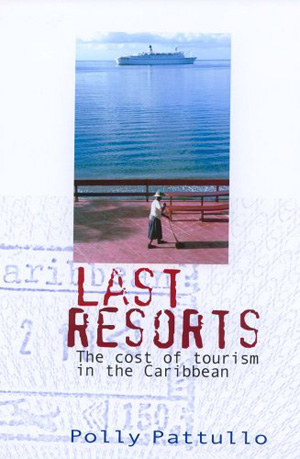Polly Pattullo, Last Resorts: The Cost of Tourism in the Caribbean, 2nd ed. (New York: Monthly Review Press, 2005), 271 pages, paperback, $22.00.
The four S’s (sun, sand, sea, and, sometimes, sex) draw millions of tourists, mostly Americans and Europeans, to the Caribbean annually. The tourist “products” available to the consumer include packaged holidays, ship cruises, yacht charters, water sports expeditions, cultural, eco-, and sex tourism. And the “islands in the sun” are no longer the exclusive vacation destination for the rich and famous — anyone with a few bucks can book an economy cruise at their local Wal-Mart or online.
Polly Pattullo’s Last Resorts: The Cost of Tourism in the Caribbean dissects the industry in detail. Her study examines the issues of the economic, social, and environmental impacts of mass tourism and how the industry reinforces the unequal distribution of wealth and foreign control of the region. The book also offers important insights into the political history and current dilemma of the islands as dependant nations in the global economy.
The Caribbean has been a target of exploitation since the arrival of Columbus who took several Arawaks prisoners to guide him in his frenzied but fruitless search for gold. During the subsequent colonization, large numbers of the native inhabitants were taken as slave labor to work on the huge plantations that produced agricultural products for European consumption. The natives soon died out and were replaced by the more resilient African slaves, ancestors of many of the region’s present population. Five hundred years after the European invasion, vestiges of the imperial legacies of racism and cultural hegemony continue to plague the Caribbean.
The promise of independence and prosperity in the post-colonial Caribbean never materialized. Regional progress succumbed to the economic patterns established during colonial times and enforced by the former colonial powers and the emerging U.S. empire — the dependency on foreign capital, the import of manufactured goods, and the export of agricultural products. During the last half of the 20th century, Caribbean tourism — centered around glittering pleasure domes owned and operated by foreign interests for foreign guests and served by the descendants of former plantation workers — joined the list of industries that continue to transfer the wealth of the South to the North.
Pattullo’s book documents how the industry works and how the problems created by it have been aggravated by the penetration of neoliberalism into the Caribbean. The WTO, through GATS and its financial institutions, the World Bank and IMF, is strengthening the position of the international companies in the tourist industry and consolidating the domination of the South by the North.
The current political struggle in the Caribbean is the same one that overshadows the entire Third World — the struggle against the neoliberal agenda that seeks to subordinate the weaker nations of the earth to the interests of global capitalism. In the context of continuing globalization, Pattullo maintains, the central question in the Caribbean is if the tourist industry is the last resort for the region.
Richard D. Vogel is an independent socialist writer. He has recently completed a book, Stolen Birthright: The U.S. Conquest and Exploitation of the Mexican People.

